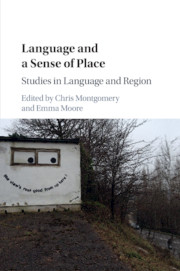Book contents
- Language and a Sense of Place
- Language and a Sense of Place
- Copyright page
- Contents
- Figures
- Tables
- Contributors
- Preface and Acknowledgements
- Introduction
- Part I Changing Places
- Part II Describing Places
- Part III Identifying Places
- 9 Identifying Places
- 10 ‘I Stole It from a Letter, off Your Tongue It Rolled.’1 The Performance of Dialect in Glasgow’s Indie Music Scene
- 11 Where the Black Country Meets ‘Black Barnsley’1
- 12 ‘The Land Steward Wouldn’t Have a Woman Farmer’
- Part IV Enregistering Places
- Index
- References
10 - ‘I Stole It from a Letter, off Your Tongue It Rolled.’1 The Performance of Dialect in Glasgow’s Indie Music Scene
from Part III - Identifying Places
Published online by Cambridge University Press: 13 July 2017
- Language and a Sense of Place
- Language and a Sense of Place
- Copyright page
- Contents
- Figures
- Tables
- Contributors
- Preface and Acknowledgements
- Introduction
- Part I Changing Places
- Part II Describing Places
- Part III Identifying Places
- 9 Identifying Places
- 10 ‘I Stole It from a Letter, off Your Tongue It Rolled.’1 The Performance of Dialect in Glasgow’s Indie Music Scene
- 11 Where the Black Country Meets ‘Black Barnsley’1
- 12 ‘The Land Steward Wouldn’t Have a Woman Farmer’
- Part IV Enregistering Places
- Index
- References
- Type
- Chapter
- Information
- Language and a Sense of PlaceStudies in Language and Region, pp. 215 - 233Publisher: Cambridge University PressPrint publication year: 2017
References
References
Websites
- 1
- Cited by

